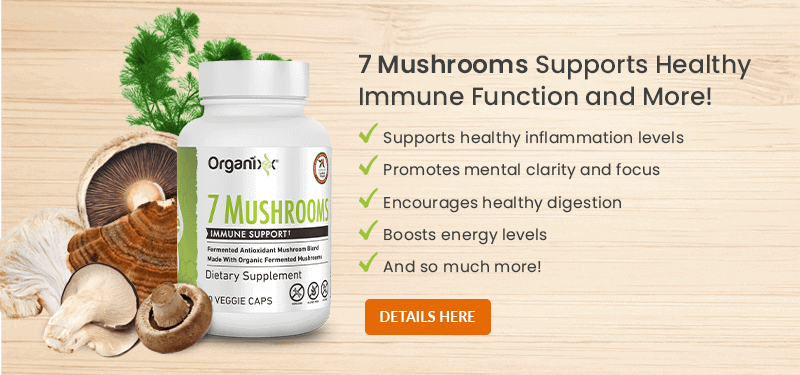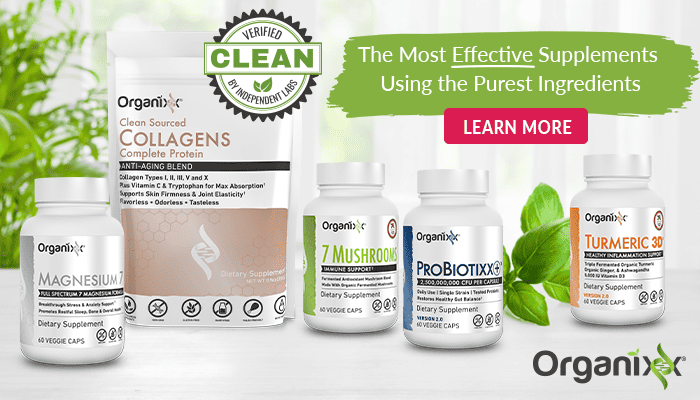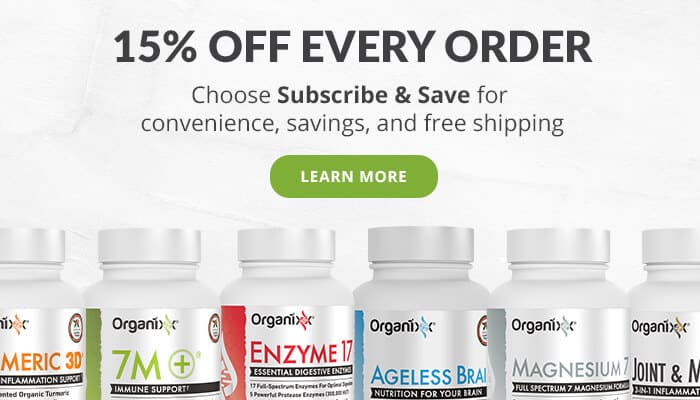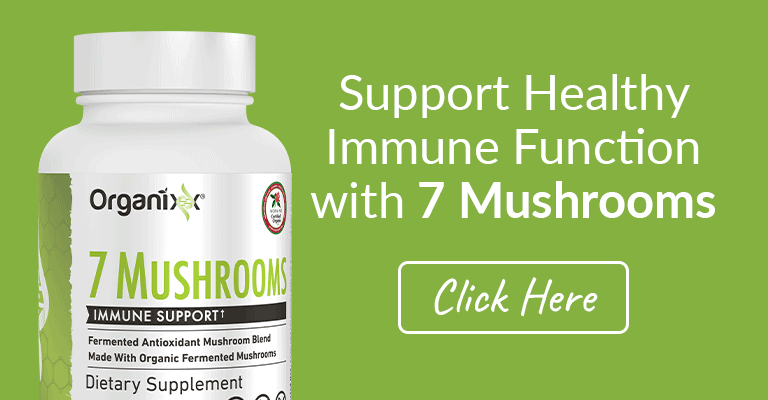Video Transcript:
Today, I want to talk to you about women’s heart health and the influence of our hormones in keeping us heart-healthy. And this is really impactful for women, particularly, who are going through hormonal imbalances. Whether they are teens and young adults or women in their mid-life age, maybe dealing with perimenopause and menopause and post-menopause, there is a direct influence and link between the balance of your hormones and the state of your cardiovascular health.
This is really complex, and to be honest with you, as a functional medicine provider, the majority of my patients are not tuned in or clued into this deep connection because our medical community doesn’t always educate, and we don’t always hear the need to test hormones, specifically if you have a family history of cardiovascular disease, or heart disease, or any type of risk of heart attacks and strokes.
So today, I want to share with you some important pieces to consider, especially when it comes to your potential risk for blood clots and your risk of heart attack, or stroke, or progression of heart disease, because your estrogen balance and your progesterone balance directly influence the state of your vascular function.
The Role of Estrogen in Women’s Heart Health
Particularly, I’m going to talk about estrogen right now. Estrogen modulates vascular function [1], and it also influences your inflammatory response. And it has a direct influence on both your metabolic process and insulin receptivity. So, if you are aware that you have insulin sensitivity or glucose intolerance, estrogen will be an underlying influence in that resistance or intolerance – your sensitivity.
Now, why is this important? Well, if you have an imbalance, either too high or too low levels of estrogen, then that directly impacts the modulation of your cardiovascular system. We know that estrogen, when it’s imbalanced, individuals will experience elevations of LDL and a reduction in HDL. We also can notate certain triglycerides being imbalanced, and even patients being diagnosed with fatty livers, and it’s a non-alcoholic fatty liver disease. Insulin sensitivity is directly linked to that, and that overwhelm and influence can cause inflammation in the cardiovascular channel and kick-off metabolic syndrome, which is an underlying factor to causing or elevating your risk behind stroke and heart disease.
So, estrogen becomes really important for us to look at evaluating. There’s also a direct correlation to when we, as women, naturally go through hormonal changes where our estrogen output and our estrogen production decreases. That tendency where we have elevations in LDL and reductions in HDL increase.
And so, you will notice that if you’ve gone through menopause, that your normal labs, your everyday lifestyle has not changed. The only thing that’s changed are your estrogen output levels and the receptivity of estrogen in your body. And you’re also notating labs elevating LDL, and you’re starting to have your doctor talk to you about taking statins. Well, simply balancing estrogen and supporting your liver’s metabolic function of metabolizing estrogen can help you reduce your risk of heart disease and stroke, and ultimately help balance out your hormones.
Progesterone’s Influence on Heart Health – The Missing Link?
Now, on the flip side, progesterone also has a massive influence. And in my opinion, as a naturopathic doctor, I feel like progesterone is the missing link for a lot of women in terms of the connection between hormone imbalance and heart disease. And if you’re looking at reversing, limiting, or lowering your risk, it’s really important you fine-tune your progesterone levels.
Why is this important? Well, progesterone naturally is a vasorelaxant [2]. It helps to minimize the kind of stress of our vascular system. It’s a calming agent, it’s a calming hormone, and it also helps minimize what we call hyperactivity of your vascular structures. So for instance, hyperactivity might register as high blood pressure, elevated heart rate, stress of the vascular channel, so cardiovascular stress. When we have optimal progesterone levels, we will naturally have a relaxing of our cardiovascular structure and that becomes a cardiovascular protectant.
Learn More from Dr. Melissa in Masterclasses
So, progesterone is really important. And those two together – estrogen and progesterone – it’s important to keep the ratios fine-tuned. I talk a lot about this in an assortment of my masterclasses. I have hormone mastery masterclasses where we talk about how to specifically fine-tune the ratio – it’s a three-to-one ratio between estrogen and progesterone and why that’s really important, especially when we’re in perimenopause or going through menopause.
And I also talk a lot about hormone influences for men and women in my cardiovascular masterclass. So, I have a whole heart-health-focused masterclass where you can really learn more about not just these hormones, but there are also an assortment of hormones that are very much regulatory influences and certain hormones signaling and receptivity that will greatly influence the mechanisms of your cardiovascular health.
A Direct Link Between Hormone Imbalances and Heart Health
So, I want you just to know if you are watching right now, and you know for sure, because you’ve had labs and you’re also represented in hormonal imbalance symptoms, if you have hormone imbalance, there is a direct link to your cardiovascular health. And so, it’s really important that you take steps to balance out your estrogen and balance out, particularly, most of us have to level up our progesterone.
So, I hope this was helpful. Do you know the way the body works? We are symbiotic. The influences of hormones will affect an assortment of body systems and mechanisms within the body. And so, modulation and the mediation of hormones directly has, in some cases, a negative influence on your heart health. And when we’re balanced, it has a positive influence.
So, that’s my huge female health tip today, specifically helping you really, really balance and lower your risk factors for heart disease, because it is the number-one killer of women. And most of the time, we are not educated, nor are we studied in a lot of clinical research about heart health. But what we do know is there are great influences our estrogen and progesterone place on our heart health. So fine-tuning that is going to be absolutely critical for you achieving optimal cardiovascular health.
Organixx is your one-stop-shop for the most up-to-date health tips… all-natural remedies… and organic solutions for all your health needs. See our full product line here.
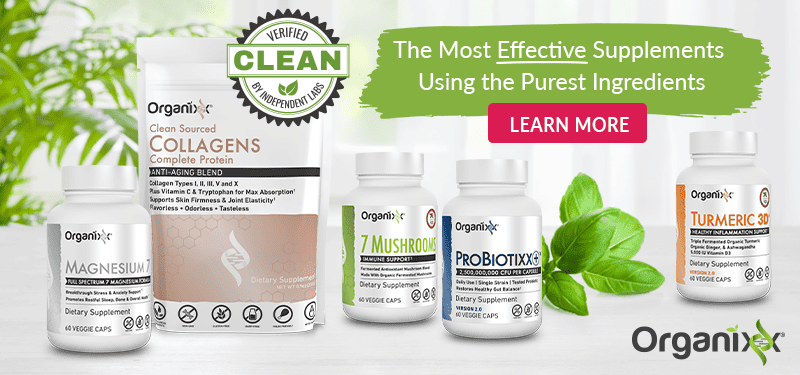
Video Transcript:
Happy Heart Health Awareness Month! I am going to share with you today four very important cardiovascular risk factors to be aware of that your doctors are not detailing fully that can literally change your life and can prevent heart disease, heart episodes like heart attacks, stroke, and all of the other assortment of imbalances in your heart health.
1. Too Much Sugar
So, the first cardiovascular risk that nobody’s really zeroing in on is that your sugar intake from both a dietary perspective and or your body’s natural production like insulin, is one of the greatest risks or risk factors that leads to breakdown of your cardiovascular health. And you might ask, “Dr. Melissa, how is that possible? I thought salt was the thing we’re supposed to be aware of,” and actually sugar is the worst. Out of any other element that influences the heart health, sugar is a direct leading source of cardiovascular imbalances. And I would gauge to state that it’s one of the number-one factors in terms of individuals who might be experiencing pre-diabetic states or consuming your standard American diet that have insulin imbalances.
So, if you are looking to get control of your heart health, be preventive, or reverse some of the staging of heart disease and heart cardiovascular imbalances, really understanding your blood sugar levels and your daily hourly insulin levels is going to be critical.
You might see a lot of people now have these patches that they put on their arm and it connects up to their phone where they can literally track after I eat a meal, insulin either spikes or stays maintained. Everybody’s biochemistry is different and so it’s really important to be able to track your blood sugar as well as the insulin on a not just morning fasting basis like we usually see in lab tests, but throughout the day. And there are influences, and particularly number four in this video for you is going to highlight this further.
2. Magnesium Deficiency
So number two, the second cardiovascular risk is deficiencies in magnesium. Last year, I talked about magnesium, our Magnesium 7, and the connection to heart health, but it’s really, really important to know that over 95% of individuals here on earth are lacking in some degree of magnesium.
There are different types of magnesium. There are certain forms of magnesium that are better for your heart health. There are others that are more productive for minimizing fluid retention, which can be really helpful if folks have chronic vascular insufficiency or have assorted fluid retention related to heart failure.
But there’s also other magnesiums that are really good for your heart tissue. Magnesium, most importantly, when it comes to your overall cardiovascular health, when we have optimal, not just normal in the middle range, but optimized high level, in the range but optimized magnesium, we minimize the body’s accumulation of plaque, particularly bone matter in our cardiovascular system.
For anybody who’s had a family member that has suffered from arterial sclerosis, that’s a thickening or hardening of the arteries. The thickening and the hardening that narrows the walls of that artery, it’s bone matter, and so magnesium minimizes calcium from getting into your cardiovascular system. That is absolutely critical.
3. Not Exercising Every Day
Number three, as far as cardiovascular risks, are individuals who are not doing daily cardio. This is really important. Exercise is important. 30 minutes minimum of cardiovascular effect where you’re getting your heart rate, you’re getting a sweat on – brisk walking, swimming, even rebounding for 30 minutes is really great. But not doing that every day is a risk factor.
So, I have a lot of folks that are fitness enthusiasts, they’re in the gym, and individuals that may be only lifting weights and not doing cardio or they’re not doing the HIIT and the intensity, getting the blood pumping that might not qualify as cardio specifically.
4. Neglecting Stress Levels
Now number four, this is really important. The really, really key critical factor for minimizing both stress levels in your body, the cortisol hormone, as well as minimizing the spikes of insulin or imbalances in blood sugar, is getting control of the stress hormone. So, high blood pressure, elevated heart rate, high cholesterol, and even elevations in triglyceride levels, all are contributed to an increased cortisol level.
So, cortisol is our stress hormone that our adrenals produce. This is a fight-or-flight stress response mechanism. And cortisol is a natural, innate hormone that helps us either get our bodies ready to fight or flight, to run, and that activity naturally requires a spike of energy. So, insulin increases, which is bad for the heart, talked about that first, but it’s also going to trigger a central nervous system response, elevation in blood pressure, elevation in heart rate and cortisol is clogging and overwhelming to your liver, which leads to increases in triglycerides and cholesterol.
So, the traditional model is to combat cholesterol by giving you a statin drug. But what that doesn’t address is the source, which is stress hormone called cortisol. I do a lot of cortisol testing with my patients. We actually do saliva-based testing. You can get a four-panel snapshot throughout the day, gives us a really good idea of this ideal cycle, very much like our circadian cycle, but cortisol management and keeping cortisol calm and in the levels we need at certain times of the day can really turn around the state of your heart health.
So, those are four powerful risk factors that many people, especially your clinicians, are not discussing that I know will literally change the state of your heart health, will help prevent heart disease, and might save you or maybe a family or friend’s life. So, I’m excited to share this information with you today.
Magnesium deficiency is linked to stress, diabetes, heart disease, osteoporosis, chronic fatigue syndrome, depression, anxiety, trouble sleeping, sore muscles, migraines, and many more debilitating health conditions.
If your body needs magnesium, you want the most beneficial kind your body can actually absorb. Organixx Magnesium 7 gives you seven (7) of the very best, most bioavailable types of elemental magnesium available.

Video Transcript:
I’m so excited to share with you today four of our favorite, best resources here at Organixx for improving your heart health.
1. Collagen
Number one is collagen. Our Clean Sourced Collagens are amazing for helping muscle and soft tissue repair. Our assortment, five different types of collagen, it’s very powerful. These collagen types are helpful at supporting the turnover of the cellular process of your heart health, as well as muscle health, and your vasculature. So, overall, collagen is a good repair agent for supporting the functionality of your heart and cardiovascular health.
2. Turmeric 3D
The second supplement that I love is our Turmeric 3D, or T3D. It’s very turmeric-forward, and turmeric is a powerful herb for supporting our heart health. One of the overwhelming benefits of turmeric is that it’s an anti-inflammatory. So, when we’re talking about heart health, and heart disease risks, and risk factors behind stroke and heart attack, and that kind of vascular inflammatory disorders, turmeric is very helpful at lowering overall systemic inflammation, and it also serves to function as a natural diuretic.
Now, quick warning on this, if you are taking any kind of blood-thinning medication like a warfarin, you want to be very cautious of taking also turmeric. So, turmeric is kind of the nature’s natural alternative to a warfarin or a blood thinner, and that’s the other powerful benefit that turmeric provides, is it does thin your blood and helps to move your blood.
So, folks that have been diagnosed with thicker blood or notate a little bit higher elevations of LDL being transported through the blood, that would be a very powerful resource.
3. Magnesium 7
Now, third is honestly one of my favorites, and it’s our combination, or multi-form magnesium, or Magnesium 7. So, magnesium, overall, is going to be one of the most powerful minerals for your heart health. And simply put, magnesium is like a cardiovascular bouncer. It helps to keep out calcium from all aspects of your vasculature.
So, it will help minimize the buildup of hard, kind of gunky bony plaque, which is simply from calcium that is not being articulated and remineralized in other areas, like our bone or our teeth. So, when we’re talking about magnesium in the function of supporting our heart health, calcium blocking is the core powerful function magnesium provides for your heart health.
Now, magnesium, again, this is all different forms, we’re giving you seven different forms of magnesium. Some forms of magnesium are going to be more functional and helpful at moving your bowels, and that is very powerful at helping lower cholesterol levels, keeping things moving. There’s also a lymphatic function where we get the lymphatic fluid moving, which helps minimize the arterial pressure. This is really complex, but basically, there’s this connectivity between our blood vessels and our lymphatic system. It’s how the blood gets rid of toxicity, and it also is the way that it moves the lymphatic system. And there’s this pressure, there’s this kind of interweaving of vessels where there’s a transport mechanism and there is a pressure. It’s pressurized. Well, magnesium helps to get things moving out and through your blood, your lymphatic system.
So, when we’re talking about, maybe you’ve got some congestive heart failure, or edema, or swelling of the ankles, or even maybe are dealing with gout, all of those things can influence the fluid levels and constrain your heart health. Magnesium is great for helping excess fluid that is in the interstitial space, the kind of open space in our vasculature and in around our body. It helps articulate it and move it out. That is very helpful for reducing the overwhelm the heart has in pushing the volume of blood and other fluids in our body.
4. 7 Mushrooms [formerly 7M+]
Now, our fourth, and just powerhouse, is a functional mushroom that you’re going to find in our 7 Mushrooms [formerly 7M+] product. And the functional mushroom here is called chaga. Chaga is one of my favorite adaptogenic functional mushrooms. Adaptogenic, meaning it helps your body adapt to everyday stressors. So, if you are studying and doing a lot of reading and are doing mental work, it helps you adapt to that mental work. If you, later on in the day, are doing a lot of physical activity, it helps your body process and recover and repair after that physical activity.
Chaga also has some really powerful heart-healthy benefits, and I highlight this in another video here this month. I’d have you reference that, but specifically, chaga is great for lowering your elevations of LDL, and it’s an anti-inflammatory.
So, overall, these four supplements, our collagen, our Clean Sourced Collagens, T3D, our MAG7, and our 7 Mushrooms [formerly 7M+] functional mushroom blend that’s chaga-forward. They’re great. So powerful for helping support your heart health.
And if you are looking at being proactive and reducing your heart health risk and helping reduce the inflammation levels in your body systemically, that is a powerful thing to do to reduce your risk of heart disease, strokes, and heart attack. So, I hope you check out these four items in our catalog here at Organixx. They are great for heart health.
One easy way to keep your health on track? Consider subscribing to the supplements you take regularly to help maintain consistency. Organixx Subscribe & Save makes it simple and stress-free for you to receive automatic, ongoing shipments of best-in-class supplements right to your doorstep… and you’ll always get 15% off the price, free shipping, priority stock, and you’ll never run out when you choose this option.
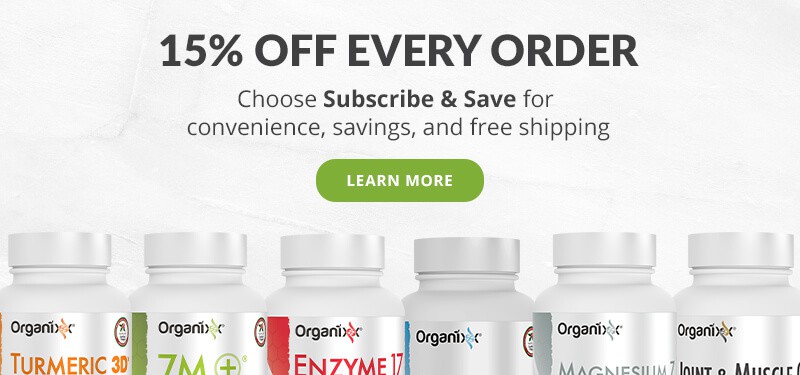
Video Transcript:
Today’s question comes from one of our viewers who wrote in saying this, “I am older and I have osteoporosis. I have 1200 milligrams of calcium that I take at night. When should I take Mag 7?” (The Magnesium 7 that we have here at Organixx.) They also write, “I’ve been told too much magnesium is contraindicated to take with calcium.”
So, this is a great question. And I first want to clarify that calcium and magnesium are very powerful when taken together.
Understanding Calcification of the Cardiovascular System
Particularly, calcium that is not matched with magnesium can actually be harmful. So, I’m not quite clear on who maybe highlighted that they shouldn’t be taken together or there’s contraindications in taking calcium with magnesium. But the reality is that if you do not have a calcium that accompanies, or you take an additional supplement like Magnesium 7, what’s happening is you are just delivering calcium into your body. And if you are in a deficient state, which about 95-98% of us are deficient in magnesium, you now have no blocking mechanism for calcium in its delivery and transport into the vascular channel.
So, you can actually be causing more calcification of your cardiovascular system. Meaning that the calcium, when it enters, because it’s not blocked by magnesium. Magnesium is like the bodyguard. If the nightclub is your vascular channel, magnesium is the blocker, the night guard, and it makes sure that calcium is articulated in the right place, the right location, (i.e., bone and teeth). And when that doesn’t occur, calcium can get into your vascular channel, and implant along the walls of your vascular system.
So, meaning the walls of your veins, your arteries, and even sometimes in your heart. So that can be problematic when we’re looking at an exorbitant amount of calcium, 1200 milligrams, I’m not quite clear on what type or form of calcium you’re taking. That’s a lot. And because it’s unchecked, meaning we don’t have the balancer blocking it from being articulated into the vascular channel, you’d want to take magnesium with that dose. And because we’re looking at a high dose of calcium, I would probably do two or three doses of Magnesium 7. And again, it depends on the form of calcium. Some calciums are going to be more caustic to the vascular channel than others.
Plant-Based Calcium Is Best
So, always read your labels and you want to try and go as plant based as you can with calcium. There’s a likelihood of it being absorbed properly and articulated because a lot of times plant-based calciums will have a natural accompaniment of magnesium. But Magnesium 7, here at Organixx, is powerful at minimizing any type of further-down-the-road risk of arterial sclerosis, which is the leading cause of heart disease, heart attacks, and stroke. And it all comes back to the fact that we are overloading our bodies with calcium and we’re in a deficient state of magnesium and it’s not matched.
So, I hope that’s helpful. Just know magnesium is an absolutely essential mineral and it is necessary in over 600 different body reactions. And because of that, we need to get that into your body. And this is definitely one where you can microdose – take magnesium in the morning, take it in the evening. And that helps keep your digestive process flowing and helps to minimize any calcium from building up in places where it does not need to be, like your arteries and your veins. So, I hope that’s helpful. Let us know if you have any more questions and we appreciate you for being a valued customer here at Organixx. Have a great day.
Magnesium deficiency is linked to stress, diabetes, heart disease, osteoporosis, chronic fatigue syndrome, depression, anxiety, trouble sleeping, sore muscles, migraines, and many more debilitating health conditions.
If your body needs magnesium, you want the most beneficial kind your body can actually absorb. Organixx Magnesium 7 gives you seven (7) of the very best, most bioavailable types of elemental magnesium available.

Video Transcript:
Today, I’m going to share with you the most critical mineral complex that you need to add to your life to optimize your heart health.
Correlation Between Magnesium Deficiency and Heart Health
One of the things that we see in clinical evaluation of mineral levels is that individuals across the globe are deficient in magnesium. And there’s a direct correlation between your magnesium levels and the state of your heart health. Particularly, magnesium shows itself in highest form in our heart tissue. And in fact, the left ventricle is where the majority of the heart’s work is performed, and that’s where we see high level and high concentrations of magnesium.
So if you’re looking to prevent heart disease, or even reverse heart disease, magnesium that you can find here in Magnesium 7, can be a very powerful, potent heart disease prevention and reversal supplement. This is something, magnesium does not get billed as a powerful heart health supplement. But what we know is that individuals, patients with low magnesium levels, have greater instances of heart disease.
And research shows us that when we supplement with magnesium, we can decrease our cholesterol and our saturated fat content. This is really important because a lot of times people think, “oh, cholesterol causes heart disease, and it can lead to thickening of our arteries and cholesterol turning into kind of an arterial clogging situation.” But it’s the low magnesium that decreases heart functionality.
Undercurrents of Heart Disease
So, if you’re looking at the kind of undercurrents of heart disease and lowering your risk, it is really critical that you boost up your magnesium levels. So consuming Magnesium 7 is a complex with an assortment of magnesium forms and types that will target maximizing your heart health. And when we look at individuals who take magnesium in clinical studies, they take optimal forms of magnesium, they have reduction in high blood pressure. We see a reduction in metabolic syndrome – that’s the kind of underlying current and underlying cause of insulin resistance and glucose intolerance that can cause excess weight gain and lead to heart attack and stroke risks. We also see that patients will show a decrease in LDL and an increase in HDL when they’re increasing their magnesium.
Magnesium also plays a role in the accumulation of calcifications in the vascular channel. Now that might sound like some crazy concept, but basically, if you are familiar with any family member who has had any type of arterial sclerosis – a thickening of the vascular walls – well, the arterial sclerosis, simply put, is bone matter – calcifications of the actual blood vessels. That calcification occurs, simply put, because of low magnesium. Magnesium is a calcium gatekeeper. And what magnesium does is it limits the amount of calcium that can get through and into our cells, and can build up along the lining of our vascular walls.
So what we see, clinically speaking, is that individuals, when we’re testing magnesium, we have found through an exorbitant amount of research that our current labs, number one, are not running magnesium. We’re not seeing it in our chem panels, you have to request this to be done. Our current normal range is even lower than what we need. Any level that’s six mgs or lower, six milligrams or lower, is going to show you in a magnesium deficiency.
Ways to Get Your Magnesium
So literally, a magnesium supplement can save your life. It can save you from heart disease, heart attack, angina, arterial sclerosis – some of the major leading causes of fatalities due to heart disease.
So this magnesium, I recommend taking your dose throughout the day. Take a dose in the morning, and take a dose right before bedtime, your evening time. And magnesium is something you can also get in food. So I’m going to share with you some of the top magnesium-dense foods.
A quarter cup of wheat bran is going to deliver the greatest quantity of natural magnesium – it comes in at about 89 milligrams of magnesium. Then an ounce of almonds is also beneficial, we see that in the 65-67 milligram range. Also one ounce of cashews. So almonds and cashews are highly dense in magnesium. A half a cup of spinach. If you add that daily or double it, you get a cup of spinach a day, you’re increasing your magnesium levels. And also lentils.
So magnesium, friends, is going to be one of your heart’s best friends in terms of helping support its health. And can be both preventative and a reversal of heart disease.
I’m so excited to share this information with you. Because here at Organixx, you can purchase Magnesium 7 down below. So click on the link that we’ve added. I’m excited for you to try it, add it to your life. Your heart will be happy as a result.
Magnesium deficiency is linked to stress, diabetes, heart disease, osteoporosis, chronic fatigue syndrome, depression, anxiety, trouble sleeping, sore muscles, migraines, and many more debilitating health conditions.
If your body needs magnesium, you want the most beneficial kind your body can actually absorb. Organixx Magnesium 7 gives you seven (7) of the very best, most bioavailable types of elemental magnesium available.

Video Transcript:
I’m so excited to share with you a naturally-producing antioxidant that is in your body currently, that you can tap into and invigorate to support your heart health. CoQ10, the elixir of life is an amazing, powerful antioxidant and mitochondrial enhancer that your body naturally produces. Now, one of the things that happens, by the age of 30, 35 we start to see our CoQ10 levels naturally start to decline. And with the use of a lot of medications – a lot of times our statin drugs, our blood pressure medicine, our blood sugar medication, and even our anti-anxiety pills for depression, these can also influence and decrease our CoQ10 levels.
So, if you’re over the age of 30 and maybe you’re taking one or more medications, investing in supplemental CoQ10 is going to greatly enhance your heart health.
CoQ10 & Heart Disease
Now, Coenzyme Q10, CoQ10, that is a compound, an enzyme, that was discovered by the Japanese in the 1970s, and they continue their research even to today. Remarkably, the Japanese use CoQ10 to combat and even reverse assortments of heart disease or heart health conditions. And we see that utilized here in the States very gently, so I want to share with you some other benefits of incorporating CoQ10 into your life, because this is one amazing powerhouse energizer and supportive to your overall wellness, and will support your heart health.
Heart disease, often when we’re testing individuals with their Coenzyme Q10 levels, they have subpar, sub-optimal levels of CoQ10. And we often see CoQ10, the particle, the enzyme existing in the cells of our heart and the cells of our gum tissue. For patients that maybe have heart disease or patients who have gum disease, it’s indicative that they have CoQ10 that has decreased a bit. It might be something for you to invest in, checking your CoQ10 levels. But this elixir of life is amazing. It provides our mitochondria, the heart of our cells, it provides this rejuvenation where it powers up the energy output of our cells. It actually is what we call a free radical scavenger. It minimizes oxidative stress on our bodies, but particularly our cells.
CoQ10 Supports Heart & Gum Tissue
When our cells are influenced by stress, environmental toxins, bad food choices, medications, and internal biochemistry imbalances, we find that oxidative stress shrinks and reduces the vitality of our cells. And the elixir of life, CoQ10, can revitalize our cells, supporting the mitochondria, the energy source, heart of our cells. That will improve fatigue, it will help support mental acuity. We will see enhances in performance, physical performance. And this is all highly documented, highly researched, where we see, in its relation to heart health, we notice that an increase in CoQ10 can actually support supple heart tissue.
And I can speak specifically to my clinical experience with CoQ10. I’ve put a ton of my patients who’ve either had heart damage, surgeries, they’ve had blockages, or even dysfunction between the left and right side of the heart, when I put them on very therapeutic doses of CoQ10, within three to six months, when we re-scan their heart, they have massive improvements in the actual tissue strength and the vitality of their heart tissue.
We see the same thing with a lot of my patients that have gingivitis or any type of gum disease, periodontal disease. CoQ10 can really help support the gum tissue.
CoQ10 Helps Reduce LDL Levels and Free Radical Damage
And this is something that’s also lesser-known about CoQ10, but when you consume CoQ10 and you really support and optimize your levels, it will actually help your body reduce the LDL levels, particularly because it’s reducing free radical damage. Free radicals and free radical damage to the oxidation of our cells is the number-one leading cause for our body to produce LDL. LDL is basically a Band-Aid that your liver calls up when there’s free radical damage inside the vessels, your heart vessels, your vascular channel.
It can be in a microvessel, it can be in our arteries, and that can cause the body to call up LDL as a Band-Aid and then HDL is the source that removes that Band-Aid. If you think about cholesterol in a different format, the LDL is simply a response to free radical damage and oxidative stress. The way to combat free radical damage and oxidative stress is to introduce CoQ10, more of it, into your diet and more of it into your body.
Ways to Enhance Your CoQ10
I’m going to share some ways for you to enhance your CoQ10. You can take supplemental CoQ10. That is very powerful as a resource. There are newer, more potent forms of CoQ10 on the market, and those are easily able to be found by a quick research.
But importantly, eating meat, fish, and nuts are three powerful resources where you can daily consume CoQ10, to help power up your CoQ10 levels. And another thing, if you are trying to manage or balance your blood pressure levels, particularly for those who have high levels, there have been extensive research studies that show CoQ10 supplementation, in a therapeutic dose, so high levels of CoQ10, can actually decrease the blood pressure levels.
Now, I do want to give a little warning here, because things have to come with a warning.
CoQ10 can cause blood thinning. If you’re taking Warfarin or another blood thinner, or maybe you’re consuming turmeric or ginger, you might want to space out that dosage. And definitely, if you are taking Warfarin, talk to your clinician before you start supplementing with CoQ10.
But if you want to make a drastic change in the state of your heart tissue and support your body and really power up your cells from a systemic focus, then adding a Coenzyme Q10 to your daily regimen would be something I recommend. Not just surrounding heart health, but overall supporting your cells. It’s one of the best anti-aging supportive supplements on the market. And again, eating meat and fish and nuts are also ways for you to increase your CoQ10 levels.
7 Mushrooms from Organixx contains 7 of nature’s most powerful mushrooms for anti-aging, longevity, and immune support. Using centuries-old knowledge of the power of nutritional mushrooms and our breakthrough new formulation process we’ve unleashed the power of mushrooms in a way never before done.
